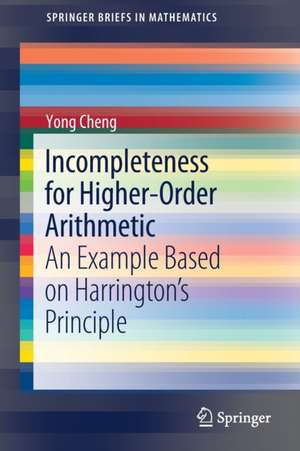Incompleteness for Higher-Order Arithmetic: An Example Based on Harrington’s Principle: SpringerBriefs in Mathematics
Autor Yong Chengen Limba Engleză Paperback – 11 sep 2019
Gödel's true-but-unprovable sentence from the first incompleteness theorem is purely logical in nature, i.e. not mathematically natural or interesting. An interesting problem is to find mathematically natural and interesting statements that are similarly unprovable. A lot of research has since been done in this direction, most notably by Harvey Friedman. A lot of examples of concrete incompleteness with real mathematical content have been found to date. This brief contributes to Harvey Friedman's research program on concrete incompleteness for higher-order arithmetic and gives a specific example of concrete mathematical theorems which is expressible in second-order arithmetic but the minimal system in higher-order arithmetic to prove it is fourth-order arithmetic.
This book first examines the following foundational question: are all theorems in classic mathematics expressible in second-order arithmetic provable in second-order arithmetic? The author gives a counterexample for this question and isolates this counterexample from the Martin-Harrington Theorem in set theory. It shows that the statement “Harrington's principle implies zero sharp" is not provable in second-order arithmetic. This book further examines what is the minimal system in higher-order arithmetic to prove the theorem “Harrington's principle implies zero sharp" and shows that it is neither provable in second-order arithmetic or third-order arithmetic, but provable in fourth-order arithmetic. The book also examines the large cardinal strength of Harrington's principle and its strengthening over second-order arithmetic and third-order arithmetic.
Din seria SpringerBriefs in Mathematics
-
 Preț: 380.25 lei
Preț: 380.25 lei -
 Preț: 380.84 lei
Preț: 380.84 lei -
 Preț: 380.29 lei
Preț: 380.29 lei -
 Preț: 383.93 lei
Preț: 383.93 lei -
 Preț: 350.11 lei
Preț: 350.11 lei -
 Preț: 352.28 lei
Preț: 352.28 lei -
 Preț: 351.57 lei
Preț: 351.57 lei -
 Preț: 378.92 lei
Preț: 378.92 lei -
 Preț: 341.60 lei
Preț: 341.60 lei - 20%
 Preț: 388.19 lei
Preț: 388.19 lei -
 Preț: 379.48 lei
Preț: 379.48 lei -
 Preț: 446.65 lei
Preț: 446.65 lei -
 Preț: 351.57 lei
Preț: 351.57 lei - 15%
 Preț: 463.68 lei
Preț: 463.68 lei -
 Preț: 377.95 lei
Preț: 377.95 lei -
 Preț: 378.12 lei
Preț: 378.12 lei -
 Preț: 352.28 lei
Preț: 352.28 lei -
 Preț: 379.68 lei
Preț: 379.68 lei -
 Preț: 376.80 lei
Preț: 376.80 lei -
 Preț: 351.90 lei
Preț: 351.90 lei -
 Preț: 380.07 lei
Preț: 380.07 lei -
 Preț: 352.28 lei
Preț: 352.28 lei -
 Preț: 350.81 lei
Preț: 350.81 lei -
 Preț: 343.72 lei
Preț: 343.72 lei -
 Preț: 349.41 lei
Preț: 349.41 lei - 15%
 Preț: 464.18 lei
Preț: 464.18 lei -
 Preț: 351.90 lei
Preț: 351.90 lei - 15%
 Preț: 464.32 lei
Preț: 464.32 lei -
 Preț: 381.00 lei
Preț: 381.00 lei -
 Preț: 344.47 lei
Preț: 344.47 lei - 15%
 Preț: 462.19 lei
Preț: 462.19 lei -
 Preț: 377.18 lei
Preț: 377.18 lei -
 Preț: 378.34 lei
Preț: 378.34 lei -
 Preț: 345.45 lei
Preț: 345.45 lei -
 Preț: 355.76 lei
Preț: 355.76 lei - 20%
 Preț: 352.85 lei
Preț: 352.85 lei -
 Preț: 453.17 lei
Preț: 453.17 lei -
 Preț: 380.45 lei
Preț: 380.45 lei -
 Preț: 377.95 lei
Preț: 377.95 lei -
 Preț: 343.00 lei
Preț: 343.00 lei -
 Preț: 562.34 lei
Preț: 562.34 lei - 15%
 Preț: 461.73 lei
Preț: 461.73 lei -
 Preț: 379.68 lei
Preț: 379.68 lei -
 Preț: 379.68 lei
Preț: 379.68 lei -
 Preț: 411.36 lei
Preț: 411.36 lei -
 Preț: 343.72 lei
Preț: 343.72 lei -
 Preț: 350.11 lei
Preț: 350.11 lei -
 Preț: 448.21 lei
Preț: 448.21 lei -
 Preț: 378.92 lei
Preț: 378.92 lei -
 Preț: 344.86 lei
Preț: 344.86 lei
Preț: 405.14 lei
Nou
Puncte Express: 608
Preț estimativ în valută:
77.52€ • 84.47$ • 65.32£
77.52€ • 84.47$ • 65.32£
Carte tipărită la comandă
Livrare economică 19-25 aprilie
Preluare comenzi: 021 569.72.76
Specificații
ISBN-13: 9789811399480
ISBN-10: 9811399484
Pagini: 122
Ilustrații: XIV, 122 p. 1 illus.
Dimensiuni: 155 x 235 mm
Greutate: 0.45 kg
Ediția:1st ed. 2019
Editura: Springer Nature Singapore
Colecția Springer
Seria SpringerBriefs in Mathematics
Locul publicării:Singapore, Singapore
ISBN-10: 9811399484
Pagini: 122
Ilustrații: XIV, 122 p. 1 illus.
Dimensiuni: 155 x 235 mm
Greutate: 0.45 kg
Ediția:1st ed. 2019
Editura: Springer Nature Singapore
Colecția Springer
Seria SpringerBriefs in Mathematics
Locul publicării:Singapore, Singapore
Cuprins
Introduction and Preliminary.- A minimal system.- The Boldface Martin-Harrington Theorem in Z2.- Strengthenings of Harrington’s Principle.- Forcing a model of Harrington’s Principle without reshaping.- The strong reflecting property for L-cardinals.
Textul de pe ultima copertă
The book examines the following foundation question: are all theorems in classic mathematics which are expressible in second order arithmetic provable in second order arithmetic? In this book, the author gives a counterexample for this question and isolates this counterexample from Martin-Harrington theorem in set theory. It shows that the statement “Harrington’s principle implies zero sharp” is not provable in second order arithmetic. The book also examines what is the minimal system in higher order arithmetic to show that Harrington’s principle implies zero sharp and the large cardinal strength of Harrington’s principle and its strengthening over second and third order arithmetic.
